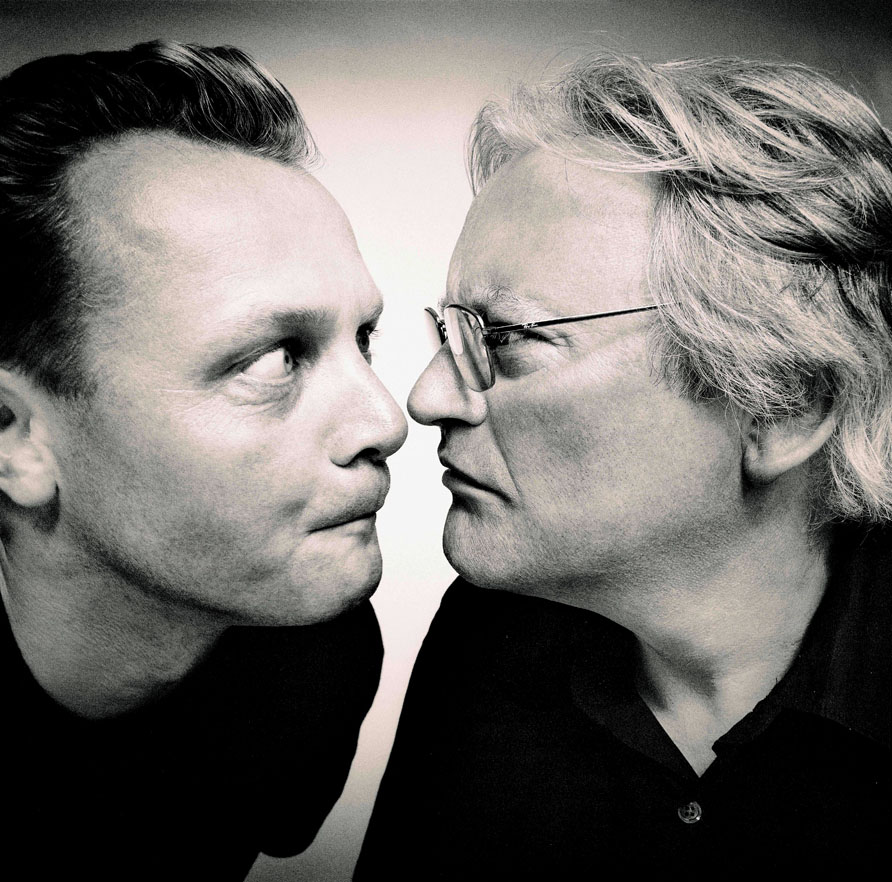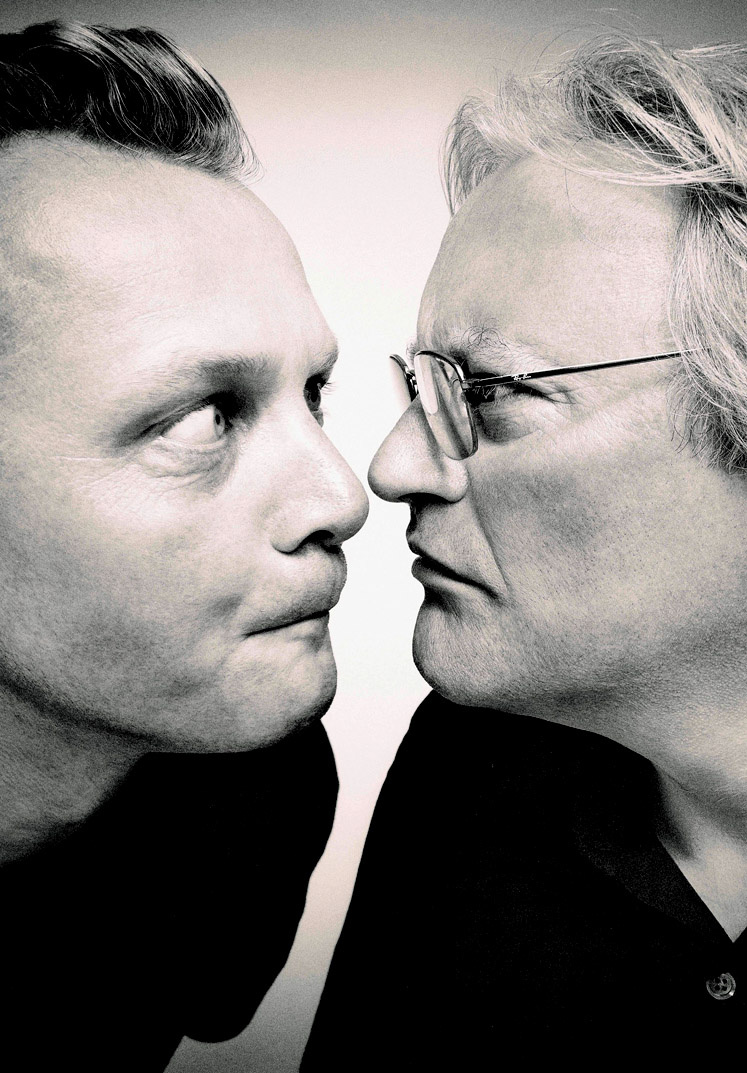
How and where did Stomp begin?
Luke Cresswell: Stomp came about over a period of time, almost like looking back on all of the crazy rhythm projects I had and realising that a show might be possible. I had performed lots of rhythmic pieces, from suspending and drumming off buildings to wearing suits of armour made of old cymbals. Working with Steve McNicholas was the key really. He has a background in theatre and helped the project grow. As he is not a drummer, he would soon point out when it became too self-indulgent and stopped the idea becoming just a long drum solo.
Did you think when it all began that the show would still be going strong twenty-five years later?
Steve McNicholas: Not at all! We thought it would have a three year lifespan and then we would probably move on! Most projects we’d been involved in had a natural lifespan of three to five years and there was no reason to think this would be otherwise. In fact we thought it might be shorter, because we weren’t really sure that anyone other than ourselves would be interested in a show purely about rhythm. To begin with Stomp was something other performers were into; it took a while for audiences to catch up.
Why do you think the show is still so popular?
LC: I think Stomp brings out the drummer in all of us. Rhythm is a language that we use every day without ever realising. Stomp reminds us of that. Another strong aspect of the show is humour; these two elements can be a very compelling combination.
SM: We are always looking at ways to improve the show, reinvent it, keep it fresh, but we have an inbuilt system whereby the performers bring their own personalities to the show. So as the cast changes over the years, so does the show. They all devise their own solos, all create their own costumes, and they have the freedom to approach an established “character” in the show in their own way. So the show changes organically as time goes by, it keeps up with the times. But the biggest factors for its popularity are really that it can be appreciated by any culture, any nationality and any age. There really are no barriers to Stomp.
What do you look for in a Stomp performer – can anyone learn how to do it?
SM: We look for a sense of rhythm and a sense of humour, and the charisma to take to the stage and have a wordless dialogue with the audience. So not everyone can do it, but it is open to anyone to give it a try. Being a great dancer or drummer doesn’t necessarily mean you will be a great stomper, and some of our key performers had never been on stage before. If the sense of rhythm is there, and we think they will blossom as performers, then we are prepared to teach the drumming.
What is the most unusual object you have ‘stomped’?
SM: For me it’s radiator hose. You’ll find them in garages, cut them to different lengths and you have a beautiful pizzicato like sound. I’m also a fan of anything that gives us a chance to use water: like the kitchen sinks.
What has been your most memorable Stomp experience to date?
SM: It’s hard to pick between performing at the Oscars, the Emmys or on the steps of the Lincoln Memorial on the eve of the Millennium! Maybe it has to be the Oscars, as we were also nominated for Best Short Film, so that was a special night.
What’s the most unusual place a Stomp routine has been performed? Is there anywhere you’d like to perform that you haven’t yet?
SM: We shot a routine under a pier in Brooklyn dockyards. The performers didn’t notice the rats and swimming crabs that routinely passed by them as they played! As for the show itself, it has played all over the world, from Moscow to Tokyo, Brazil to Bangkok. We haven’t played India yet though, that’s one for our wish list.
What has Stomp been up to since you last played Bath in 2012?
SM: Six months after our last visit to Bath, we performed at the 2012 London Olympics Closing Ceremony. We continue to tour globally and Stomp has been performed by our companies in New York since 1994 and in the West End since 2002. In 2014, we celebrated the show’s 20th Anniversary stateside at the Orpheum Theatre. To mark the occasion the world famous New York City landmark, the Empire State Building, was lit up red and white in Stomp’s colours!
Currently, we are in development on multiple 3D and 2D feature-length projects, including a Stomp-based 3D movie. We are committed to making immersive 3D films that take the audience on an inspirational journey while addressing environmental issues that affect us all.
Luke Cresswell (director) is a self-taught percussionist from Brighton. His session work as a drummer and rhythm programmer includes Beats International, Bette Midler, Elvis Costello and Bryan Ferry. After working for several years as a street musician and performer, he first created Stomp in 1991. He has directed, with Steve McNicholas, several award-winning commercials and short films. He received an Oscar nomination for the film Brooms, an Emmy nomination for Stomp Out Loud and co-directed the award winning Imax movie, Pulse. He has also received a special achievement award from the Chicago Human Rhythm Project. More recently he and Steve McNicholas have created the Lost and Found Orchestra, which explores found sound on an orchestral level. Luke occasionally performs with Stomp, and is currently conductor of the LFO.
Steve McNicholas (director), from Yorkshire, has worked as an actor/singer/musician/writer with various theatrical and musical groups, starting out with the Bradford Theatre Group in 1973. Through the eighties he worked with Cliff Hanger, Covent Garden Community Theatre and Pookiesnackenburger. Despite also being an original member of the accapella group, the Flying Pickets and a final appearance in Mr. Bean, Steve no longer performs. He shares directorial credits with Luke Cresswell on Stomp-based films and commercials and their new show, the Lost and Found Orchestra. With Luke, he composed the soundtrack to the Showtime movie, Riot, and shares the Oscar and Emmy nominations for his work on Brooms and Stomp Out Loud and co-directed the award winning IMAX movie, Pulse.


